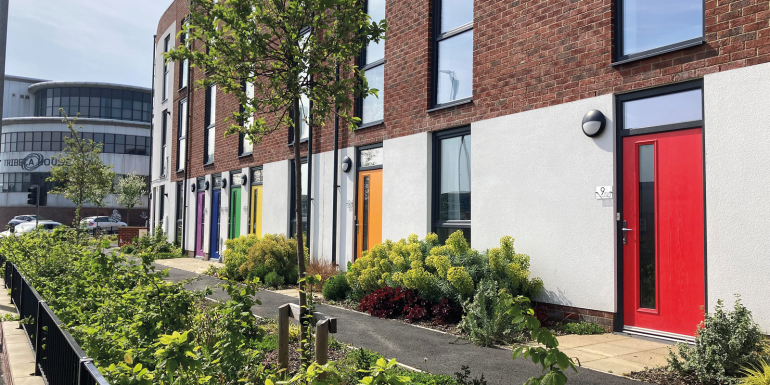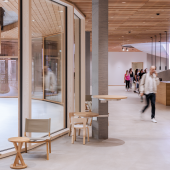With you in mind

Features such as different-coloured front doors can help residents distinguish their homes
West Yorkshire’s dementia-ready homes showcase their long-term plans to make housing accessible to all.
According to government data, the number of people living with dementia could rise to two million by 2050 – double the number of people with the disease currently. Dementia costs the UK £26.3bn a year and is a significant challenge for the NHS. For many people, staying in their own home as they age helps them live a happier, healthier life.
With this in mind, West Yorkshire Mayor Tracy Brabin set up a Dementia-Ready Housing Taskforce in March 2022, which developed dementia-ready criteria for housing. Significantly, West Yorkshire Housing Partnership has agreed to adopt the taskforce’s list of ten measures for all new homes, not just older people’s housing. The partnership, made up of housing associations as well as Kirklees Council and Leeds City Council, will incorporate as many of the criteria on new developments as possible and is also looking at how to incorporate the measures in existing homes.
Ten criteria for dementia-ready housing
- A front door that is easy to find, day or night – this could be through different-coloured front doors or adding other distinctive features such as wall-hung planters.
- Step-free access to all doors for new homes – falls are more common for those with dementia. Without a step, people can get outside more easily.
- Internal decoration that avoids confusion – dementia can change perception so bold patterns, stripes and highly contrasting floor tones may cause problems.
- The bathroom is easy to find – being able to find the toilet easily, especially during the night, helps people to retain independence and dignity.
- Bathroom locks aid rescue – falls in the bathroom are common and being able to get help quickly is vital. A door that can be unlocked from the outside in an emergency could save a life.
- A good level of natural light in all rooms – exposure to natural light improves wellbeing and can also help to prevent falls.
- A view of nature in at least one habitable room – connection with the natural environment stimulates memory and can slow down the progression of the symptoms of dementia.
- Access to an outdoor space that is easy to navigate – outdoor activity helps the brain process and co-ordinate. It also promotes a healthy sleep pattern.
- Amenities and other homes within 1km – people with dementia are less likely to drive so having amenities close by is important for independence and promoting activity.
- An active dementia champion within the housing organisation – the champion’s role is to promote understanding of dementia among their colleagues, residents and wider community.
Fatima Khan-Shah, West Yorkshire’s Inclusivity Champion, said: “While this will have a positive impact for people living with dementia, it will also benefit people living with a disability or a long-term condition, as well as their carers.”
Brabin added: “Living with dementia shouldn’t mean losing your home, community or dignity. Making homes dementia-ready means that as people get older they can remain independent in a supportive environment for longer. These simple but effective measures ensure that we have high-quality housing across the region that meets the needs of our people and communities.”
For more on the taskforce, visit b.link/WestYorks_dementiaready






